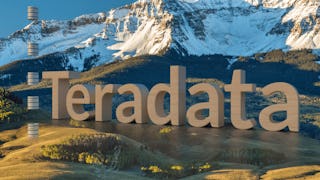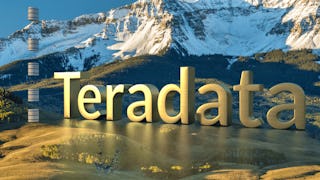Fundamentals of Teradata: Architecture, Storage & Operations Course provides a comprehensive introduction to Teradata, covering its architecture, relational concepts, indexing, join strategies, data types, and storage mechanisms. Participants will gain a deep understanding of Teradata's components, their interactions, and how data is stored, retrieved, and manipulated within the system. Additionally, the course explores best practices for data type selection, storage optimization, and error prevention. Through theoretical learning and practical case studies, participants will acquire essential skills for effective Teradata utilization.

Acquérir des compétences de haut niveau avec Coursera Plus pour 199 $ (régulièrement 399 $). Économisez maintenant.

Fundamentals of Teradata: Architecture, Storage & Operations
Ce cours fait partie de Spécialisation Mastering Teradata for Data Warehouse & Analytics

Instructeur : Board Infinity
Inclus avec
Expérience recommandée
Ce que vous apprendrez
Identify key components of Teradata architecture and explain their roles in data management.
Describe how Teradata components collaborate for efficient data storage, retrieval, and manipulation.
Evaluate different indexing and join strategies used in Teradata for optimizing data processing.
Utilize knowledge of Teradata data types and storage mechanisms to optimize performance and prevent common errors.
Compétences que vous acquerrez
- Catégorie : Data Integration
- Catégorie : Relational Databases
- Catégorie : Data Storage
- Catégorie : Query Languages
- Catégorie : Data Processing
- Catégorie : Mainframe Computing
- Catégorie : Teradata SQL
- Catégorie : Database Management Systems
- Catégorie : Performance Tuning
- Catégorie : Database Architecture and Administration
Détails à connaître

Ajouter à votre profil LinkedIn
Découvrez comment les employés des entreprises prestigieuses maîtrisent des compétences recherchées

Élaborez votre expertise du sujet
- Apprenez de nouveaux concepts auprès d'experts du secteur
- Acquérez une compréhension de base d'un sujet ou d'un outil
- Développez des compétences professionnelles avec des projets pratiques
- Obtenez un certificat professionnel partageable

Il y a 3 modules dans ce cours
Module 1: Introduction to Teradata provides a comprehensive foundation in Teradata fundamentals. Learn about Teradata's essence, its architecture, and basic relational concepts essential for database management. Understand its competitive advantages over other RDBMS. Delve into the intricate components of Teradata, their interactions, and their role in data storage and retrieval. Gain insights into Teradata's connectivity with mainframe and network applications, empowering you with essential knowledge to navigate the Teradata environment effectively.
Inclus
12 vidéos3 lectures3 devoirs1 sujet de discussion
In this module learners will delve into the intricacies of indexing, starting with an elucidation of the difference between primary keys and primary indexes. This module shifts its focus to Teradata Join Strategies. learners will explore various strategies employed by Teradata to optimize table joining processes. This includes a detailed examination of join strategies, such as inner and outer joins, utilized by Teradata to efficiently merge data from multiple tables. Additionally, learners will delve into the concept of partition primary index (PPI) tables and understand how data is redistributed for join processing, ensuring optimized performance and data integrity.
Inclus
10 vidéos2 lectures3 devoirs
Module 3: Data Types and Storage provides a detailed exploration of essential components vital for proficient data management within Teradata. learners will embark on an in-depth journey into Teradata data types, unraveling their intricacies, storage nuances, and optimal selection strategies. Moreover, learners will delve into the complexities of data storage and retrieval mechanisms within Teradata systems, understanding the inner workings of storage architectures and employing optimization techniques for enhanced performance. Through practical insights and theoretical foundations, learners will acquire the expertise needed to navigate diverse data types effectively and optimize storage solutions within Teradata environments.
Inclus
11 vidéos2 lectures3 devoirs1 évaluation par les pairs
Obtenez un certificat professionnel
Ajoutez ce titre à votre profil LinkedIn, à votre curriculum vitae ou à votre CV. Partagez-le sur les médias sociaux et dans votre évaluation des performances.
Instructeur

Offert par
En savoir plus sur Software Development
 Statut : Essai gratuit
Statut : Essai gratuitLearnQuest
 Statut : Essai gratuit
Statut : Essai gratuitBoard Infinity
 Statut : Essai gratuit
Statut : Essai gratuitBoard Infinity
 Statut : Essai gratuit
Statut : Essai gratuitLearnQuest
Pour quelles raisons les étudiants sur Coursera nous choisissent-ils pour leur carrière ?





Ouvrez de nouvelles portes avec Coursera Plus
Accès illimité à 10,000+ cours de niveau international, projets pratiques et programmes de certification prêts à l'emploi - tous inclus dans votre abonnement.
Faites progresser votre carrière avec un diplôme en ligne
Obtenez un diplôme auprès d’universités de renommée mondiale - 100 % en ligne
Rejoignez plus de 3 400 entreprises mondiales qui ont choisi Coursera pour les affaires
Améliorez les compétences de vos employés pour exceller dans l’économie numérique
Foire Aux Questions
To access the course materials, assignments and to earn a Certificate, you will need to purchase the Certificate experience when you enroll in a course. You can try a Free Trial instead, or apply for Financial Aid. The course may offer 'Full Course, No Certificate' instead. This option lets you see all course materials, submit required assessments, and get a final grade. This also means that you will not be able to purchase a Certificate experience.
When you enroll in the course, you get access to all of the courses in the Specialization, and you earn a certificate when you complete the work. Your electronic Certificate will be added to your Accomplishments page - from there, you can print your Certificate or add it to your LinkedIn profile.
Yes. In select learning programs, you can apply for financial aid or a scholarship if you can’t afford the enrollment fee. If fin aid or scholarship is available for your learning program selection, you’ll find a link to apply on the description page.
Plus de questions
Aide financière disponible,
¹ Certains travaux de ce cours sont notés par l'IA. Pour ces travaux, vos Données internes seront utilisées conformément à Notification de confidentialité de Coursera.

